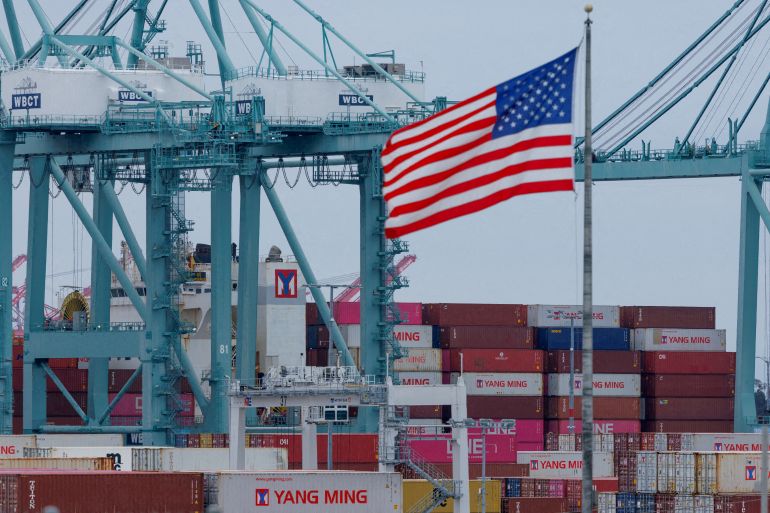A port CEO panned Trump’s tariffs. Then a Chinese envoy’s wife sent praise
Chinese diplomat’s spouse praised Port of Los Angeles CEO for opposing Trump’s trade war, emails show.

By Erin HalePublished On 18 Jun 202518 Jun 2025
As the head of the Port of Los Angeles was doing a flurry of media interviews warning of the damage caused by United States President Donald Trump’s tariffs last month, he received an email filled with effusive praise from a notable city resident.
Wang Wei, the wife of Chinese Consul General Guo Shaochun, wanted Port of Los Angeles CEO Gene Seroka to know that she found his views “practical, well-reasoned, and very convincing”.
Recommended Stories
list of 4 items
Russia-Ukraine war: List of key events, day 1,210
end of list
“I was pleasantly surprised to see your interview on Fox News this afternoon, where you shared your insights on the impact of the US-China tariff conflict on port trade,” Wang wrote in the email on May 6.
“Later, I browsed YouTube and discovered that you have recently been interviewed by several major networks, including CNN and CNBC etc. I just knew you are such a well-known celebrity and entrepreneur in the business field,” Wang continued.
“Thank you for actively speaking up and advocating for the development and exchange of US-China trade.”
Seroka responded the next day, thanking Wang for her message.
“We will continue to champion world trade,” he wrote. “There is so much we need to do together.”
The emails, obtained by Al Jazeera through a public records request, provide an unusual insight into behind-the-scenes Chinese lobbying against Trump’s trade war, which has been directed most intensely at Beijing.
China has fiercely opposed Trump’s tariffs, the most severe of which have been paused as Washington and Beijing work towards a comprehensive trade deal, accusing his administration of protectionism and “unilateral bullying”.

While the US government has grown sceptical of Chinese trade as it seeks to contain China’s rise, state and local authorities – such as the Port of Los Angeles, a self-supporting department of the City of Los Angeles – are more inclined to see the benefits of business between the sides.
Advertisement
In the week that Wang and Seroka exchanged emails, the Port of Los Angeles, the busiest seaport in the Western Hemisphere, announced that cargo had dropped 35 percent compared with the previous year.
When contacted for comment by Al Jazeera, Seroka, who has argued in interviews that “no one wins” from a protracted US-China trade war, said his exchange with Wang was typical of his work as port CEO.
“Having lived in China and other Pacific Rim countries, I have a wide range of international business relationships. Ms Wang Wei is one of many,” he said, adding that “all are in the course of promoting business at the Port of Los Angeles”.
China’s consulate in Los Angeles and embassy in Washington, DC did not respond to requests for comment.
 Despite tensions between Washington and Beijing, a more pragmatic, pro-business view of ties is widely shared at the state and local level.
Despite tensions between Washington and Beijing, a more pragmatic, pro-business view of ties is widely shared at the state and local level.
Diplomacy between lower-level officials of the countries is not uncommon, as reflected in events such as the US-China Sister Cities Summit held last year in Tacoma, Washington state.
Such engagement, however, has drawn scrutiny from Washington.
In 2022, the US National Counterintelligence and Security Centre (NCSC) warned that China aimed to exploit “subnational relationships” with local officials and legislators “to influence US policies and advance PRC geopolitical interests”.
The NCSC has more recently issued warnings about Chinese investment into US tech start-ups and efforts by intelligence agencies posing as consulting firms or think tanks to recruit current and former US officials.
While foreign diplomats routinely have contact with local officials and businesspeople about government policy, it is unusual for their family members to weigh in on such matters, a former Western diplomat in China told Al Jazeera.
“Spouses or other family members of diplomats don’t typically engage with host country counterparts on policy issues, unless there happens to be an established personal relationship,” the ex-diplomat said, speaking on condition of anonymity.
“In private social settings, family members do talk about policy with other diplomats and/or people from the host country, but in my experience it’s unusual for a spouse to weigh in – even privately – with a host country counterpart on a policy issue.”
A former US diplomat in China expressed a similar view.
“From just about any country in the world, it would be very unusual to have the spouse of a consul general comment in that way,” the ex-diplomat, who requested anonymity, told Al Jazeera.
Advertisement
“China, sometimes, can be different. Rarely, but sometimes, the spouse of a Chinese diplomat is also a government official. In those cases, they may engage in this way. Otherwise, it would usually be limited to comments on people-to-people or cultural programmes.”
Still, US government warnings about Chinese engagement with state and local authorities are largely “overblown”, the former diplomat said, calling “90 percent” of such activity harmless.
“In most cases, it’s innocuous. The problem comes when they start throwing money around,” he said.
